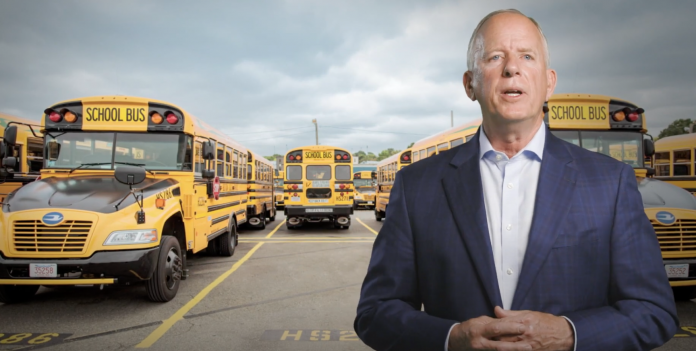Tucker Perkins, president and CEO of the Propane Education and Research Council (PERC), opened the virtual Green Bus Summit (GBS) by espousing the benefits already being reaped by implementing alternative fuel into fleets of school buses.
“Every child deserves to have a safe, clean and healthy ride to school,” Perkins said.
He explained on Tuesday, day one of GBS presented by School Transportation News, that there are two ways to achieve a safe, clean and healthy ride; propane or electric school buses.
“If you are using either one of those today, I applaud you for your efforts and congratulate you on your decisions to give students in your care a clean ride to school,” Perkins said.
Still, Perkins made a case for propane over electric vehicles with five benefits realized by school districts.
He broke down cost into three categories: Initial cost, which he said is comparable to diesel prices and a quarter of electricity; operating cost, which is half that of diesel buses and could result in a cost savings to put money back into the classrooms; and infrastructure cost, which he noted can be free of charge and courtesy of fuel providers or grants.
He also noted that the vehicle range when using propane is comparable to that of a diesel school bus.
Perkins then explained that propane buses operate reliably no matter the weather or operating environment. He said engines calibrated for propane start easily and warm the cabin faster in cold weather, and these buses can handle any type of incline.
He noted that propane emissions are clean. He cited a research study that found propane reduces oxides of nitrogen by 96 percent compared to diesel engines. He added that propane virtually eliminates particulate matter in the cabin, and the engine produces a quiet ride.
Perkins concluded that the cost and availability of propane as well as the time it takes to fuel a school bus are all similar to those of diesel or gasoline. He said propane offers school districts similarity, speed and convenience of refueling.
All five of these factors, Perkins said, make for a compelling case.
Perkins further discussed two districts that have made the switch to propane. For example, he said North Penn School District in Pennsylvania chose propane over electric for more reliable performance and range. Parents have also observed a quieter and healthier ride for their children, while the school board and district administration receive clean energy at an affordable cost. The community reaps the benefits of an environmentally friendly ride, which is a good use of their tax dollars.
In addition, Perkins spoke of a student at Greenville County Schools in South Carolina, who wrote a letter to the state Department of Education requesting propane school buses, as they would provide a cleaner and quieter ride to school. The student coined the term, “Out with the old and in with the new,” and Greenville County was awarded a new propane school bus.
Editor’s Note: South Carolina officials announced last week that the remaining funds from the Volkswagen Mitigation Trust Fund will be used to purchase 235 new propane school buses for the state.
Related: Accelerating De-Carbonization: Propane Council Keynote Address to Kick Off Green Bus Summit Virtual Conference
Related: Lewis County District Welcomes New Propane School Buses
Related: Micro Bird Propane Bus Achieves Coveted Low NOx Certification
Related: Liberty Public Schools Receives $20,000 for Propane-Fueled School Buses
Related: Livonia Public Schools Adds 22 New Blue Bird Propane Buses to its Fleet
To sum up his presentation, Perkins said any federal funding coming for clean energy should be used as wisely as possible to maximize the benefits, which he said is where propane fuel comes in. “Propane allows you to purchase 40 new clean energy buses instead of one electric bus,” he added.
In addition, the incremental cost of propane is around $6,000 compared to $250,000 for an electric bus, Perkins explained. Today, he said, there are about 480,000 school buses transporting students to school nationwide, with 30,000 being replaced yearly.
“If we focused on funding the incremental cost of a propane bus over diesel, we could replace 150,000 diesel buses with propane in five years,” Perkins suggested.
He noted that among the largest challenges transportation directors face is making decisions now that will affect the district for the next 10 to 15 years. He advised that the fuel choice made today must still make sense a decade from now.
Perkins explained that current studies show that propane buses being operated in 38 states are cleaner than electric buses being used there. And while electricity is on a path to become even cleaner, so will propane. He noted that using more propane accelerates decarbonization. He concluded that innovations and technology are changing rapidly and the future demands more clean energy.















